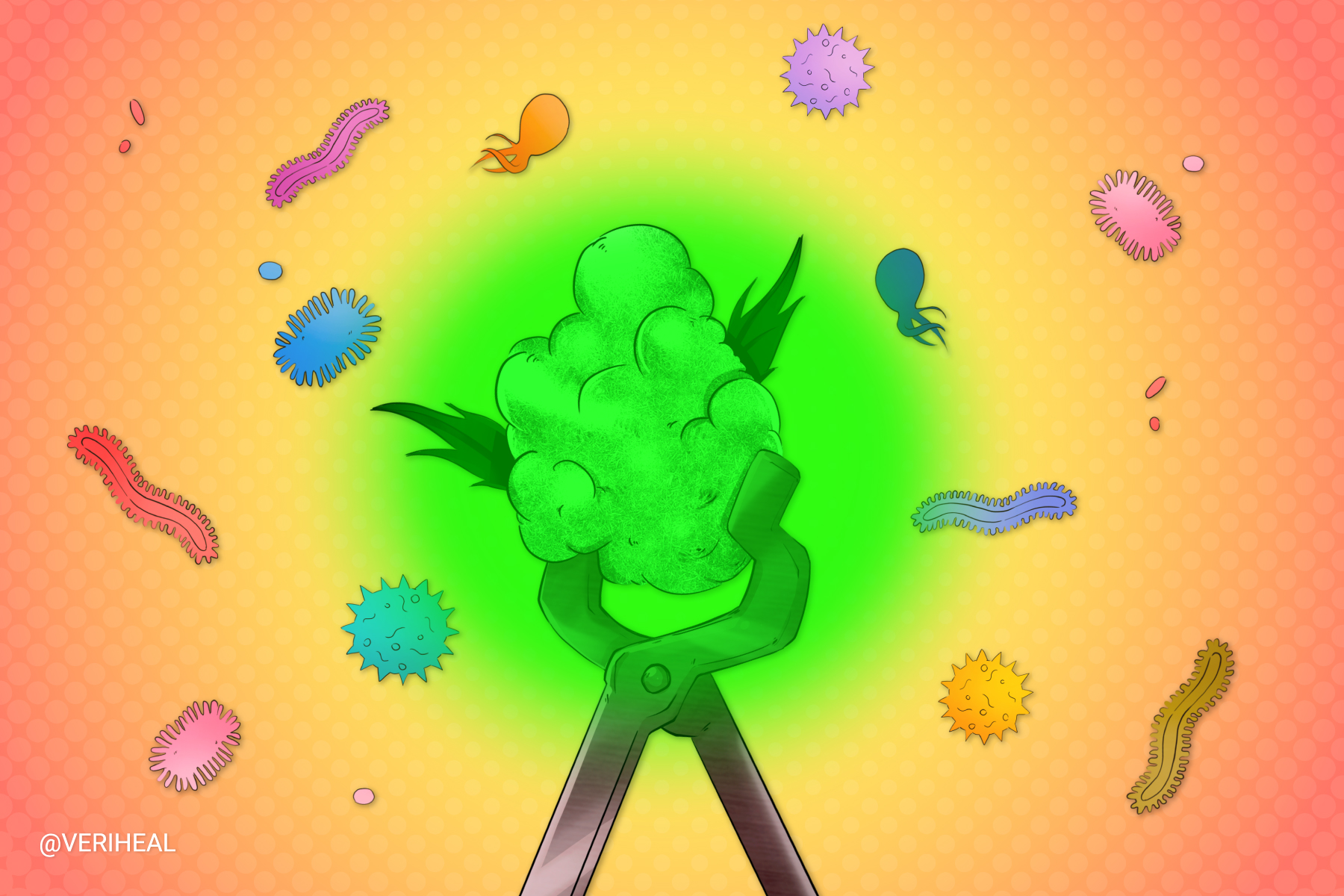During the process of cultivating cannabis, the plants undergo processing which includes drying. These processes may lead to the accumulation of pathogens such as fungi and bacteria- however, many nations have strict regulations concerning the level of pathogens that are allowed to remain on the cannabis product before going to consumers. Due to reasons such as this, some cannabis cultivators make use of irradiation on dry flowers in order to reduce the chances of and accumulation of surviving pathogens. Before getting a better understanding of the “what’s” and “why’s” of irradiated cannabis, let’s have a quick look at cannabis pathogens.
Cannabis Plants Are Subject to a Variety of Pathogens
Plant pathogens that are present on cannabis plants can impact the growth of the plant as it affects the roots, crown, and foliage of the plants. These include fungi that colonize the inflorescences (the buds) which can lead to a reduction in product quality. According to this research paper on pathogens and molds affecting the production and quality of cannabis, the following have been observed in cannabis plants with pathogens: root browning, discoloration of the crown and pith tissues, stunting growth, yellowing of plants, powdery mildew, bud rot as well as potential death to the plant. Examples of these pathogens which affect the cannabis plant include molds, mites, mildew, fungi, fusarium, viruses, and viroids. In order to reduce the number of pathogens present in the cannabis products in compliance with regulations, means of eliminating pathogens including the use of chemicals to disinfect the plants, and now some are using irradiation.
Irradiation Helps Eliminate Pathogens
Irradiation refers to when the plant is exposed to radiation. According to media reports, it’s estimated that approximately 80% of licensed cultivators are using irradiation for sterilization in Canada. Irradiation is not a new concept and has even been used for multiple purposes such as sterilizing medical equipment. Radiation is also being used to sterilize cannabis so that only the organic and therapeutic compounds remain. While using radiation is not necessary to produce contaminant-free cannabis, it has been effective in killing unwanted microorganisms while also sterilizing the products. There are many groups of individuals who are opposed to irradiation as the safety and quality of products come into question.
Fortunately, irradiation has been found to have no effect on the therapeutic components of cannabis. A study, conducted by Dr. Arno Hazekamp, analyzed different varieties of cannabis strains before and after the use of gamma-irradiation treatment. The results revealed that there were no effects to cannabinoids such as THC and CBD but that there was a slight reduction in some of the present terpenes. Dr. Hazekamp explains that this reduction in terpenes can be as low as 10% but also as high as 38%.
Why You Should Get Your Medical Marijuana Card
Veriheal has satisfied millions of patients nationwide by giving them access to these benefits
- Larger purchase limits
- Peace of mind
- Enhanced legal protection
- Access to higher potency strains
- Save up to 25% on cannabis purchases
- Skip the line at the dispensary
Dr. Hazekamp goes on to explain that some patients who have been treated with irradiated medical cannabis claimed “a change of taste or effect”, while others were concerned over the potential changes in chemical composition as well as the quality of the product. As a result, Dr. Hazekamp provided some data from research. One study found that the irradiation reduced “the content of terpenes such as myrcene and linalool” while another found no indications of “changes in cannabinoid profile”. It should be noted that the research is still in its early stages and that more comprehensive and conclusive studies need to be conducted.
As for the potential change to taste or effect, Dr. Hazehamp explains that “such opinions may be hard to substantiate because the same cannabis is usually not available to consumers in both its irradiated and non-irradiated form to allow direct comparison, meaning there is no ‘baseline product to quantify the magnitude of change”. Not to mention the fact that cannabis effects are somewhat subjective to the consumer.
Is Irradiated Cannabis Safe?
One major concern over irradiated goods stems from the formation of radiolytic compounds, 2- alkylcyclobutanones (2-ACBs) in specific. This radiolytic compound occurs when high fat-containing foods are exposed to gamma irradiation, “and their content increases with irradiation dose”. However, since cannabis is not high in fat, this concern is not really applicable in terms of using radiation to sterilize cannabis.
Dr. Hazekamp states that “gamma irradiation does not significantly heat up” the product, which means that the compounds will not get activated, and that “water may be lost during the procedure either as a result of the irradiation itself”. Additionally, the “microscopic structure of the dried cannabis flowers were not altered by standard irritation protocol.
Simply put, irradiated cannabis is the plant’s product that has undergone a process of irradiation-where it was exposed to radiation in order to sterilize the product. The main reason for such sterilization lies in complying with regulations set out by local authorities as other methods are not as effective. Besides a loss in some terpene content, irritated cannabis is said to be safe and just as effective. Like cannabis itself, there will continue to be controversy around gamma irradiation and in the end, one has to decide whether to consume, or not to, for oneself.
Author, Share & Comments








